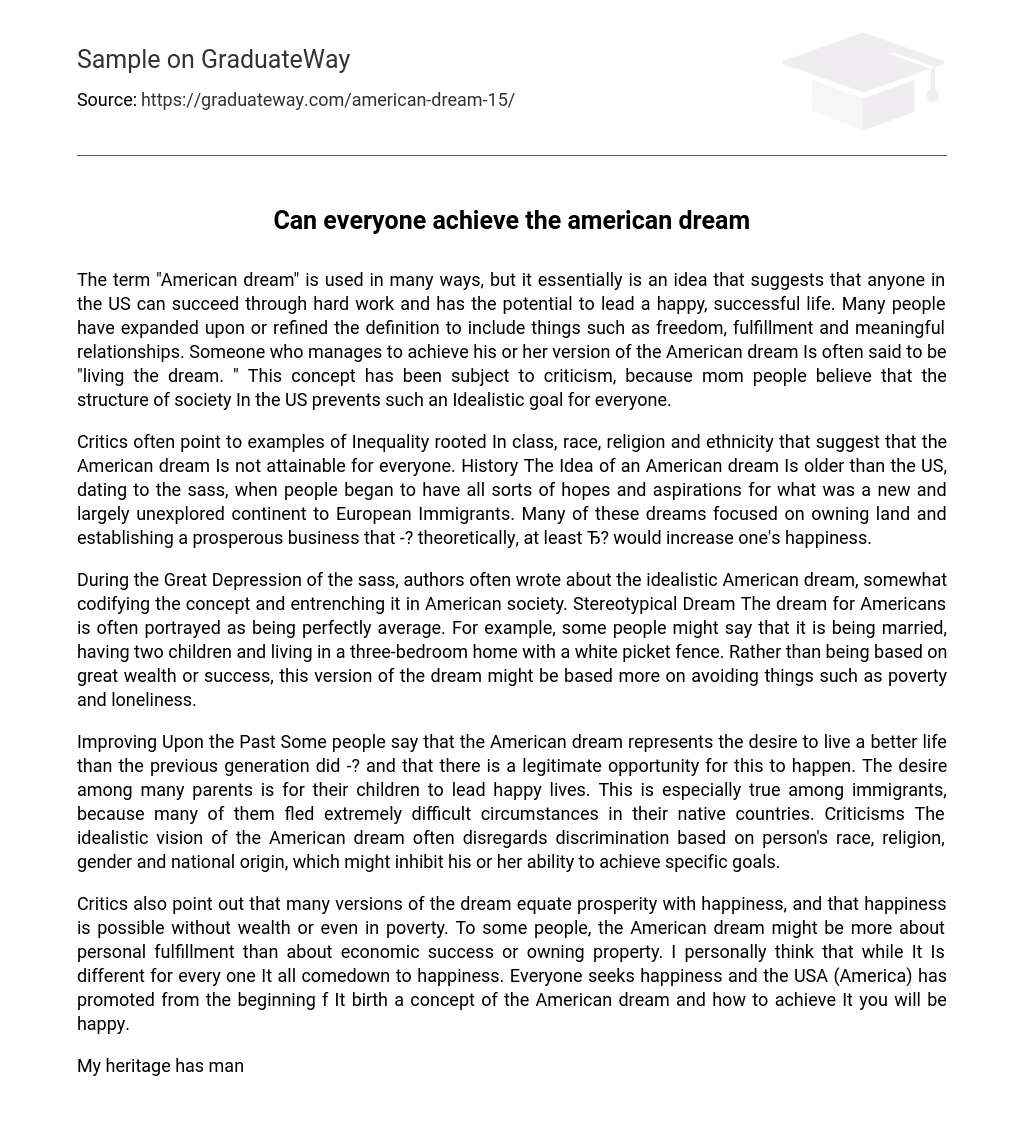The concept of the “American dream” has different interpretations, all implying that anyone can achieve success and a satisfying life in the US by working hard. Many people have expanded this definition to include values like freedom, contentment, and meaningful connections. Those who fulfill their own version of the American dream are often called “living the dream.” However, this idea has been criticized because some believe that societal systems in the US hinder the realization of such an idealistic goal for everyone.
According to critics, the American dream is deemed impossible for everyone due to inequality based on various factors such as class, race, religion, and ethnicity. The idea of the American dream originated in the 1600s before the United States existed when European immigrants envisioned their aspirations for this newfound continent. During that era, many dreams revolved around acquiring land and establishing successful businesses as a means to achieve happiness.
Authors during the 1930s Great Depression often examined and established the optimistic American dream as a prominent concept in American society. The conventional perception of this dream depicts an idyllic, ordinary American life. This could involve marriage, two children, and living in a three-bedroom house with a white picket fence. Instead of pursuing immense riches or remarkable accomplishments, this interpretation of the dream concentrates more on evading poverty and loneliness.
Enhancing the Past Some individuals argue that the American dream represents the desire for a more prosperous life than previous generations, offering real opportunities for success. Numerous parents desire their children to find happiness, especially among immigrants who have fled difficult situations in their homelands. Nevertheless, critiques of the American dream highlight its tendency to disregard discrimination based on race, religion, gender, and nationality, which can hinder individuals from reaching their aspirations.
Critics argue that various interpretations of the dream associate prosperity with happiness, but they highlight that happiness can exist without wealth or even amidst poverty. For certain individuals, the American dream could revolve more around personal satisfaction rather than economic triumph or property ownership. In my opinion, although it varies for each person, it ultimately boils down to happiness. Everyone strives for happiness and the USA (America) has advocated a notion of the American dream since its inception, suggesting that by achieving it, one will experience happiness.
My ancestors were immigrants who came to this country and engaged in difficult, physically demanding occupations while earning meager wages. They tirelessly labored throughout their lifetimes. If questioned about the rationale behind living such a lifestyle as they grew older, a simple response like “for me” would not suffice. Nonetheless, I comprehend that individuals possess diverse outlooks. Were I placed in their circumstances, I would have esteemed such an existence because in my homeland, the majority did not work and resided under conditions marked by limited sustenance and bleak prospects for improvement.
The American dream, in my opinion, is the opportunity for improvement in life, regardless of our location. There are diverse interpretations of the American Dream, including finding happiness, accepting others for who they are, ensuring fair trials, and holding countless other perspectives. It is challenging to determine if the American dream has been attained or not. Amidst these viewpoints, I believe that freedom is a significant aspiration. However, freedom comes with a high price tag and encompasses various meanings.
Freedom is essential for expressing thoughts, having rights, and pursuing desires. It plays a crucial role in achieving the American Dream and allows individuals to define success on their own terms. With freedom, people can find happiness, financial stability, equal job opportunities, and fulfillment of personal dreams. However, it is important to recognize that along with freedom comes responsibility. Fulfilling the price of freedom requires active struggle and perseverance, whether it involves attaining equality or overcoming excessive spending.
Throughout history, African Americans have longed for and worked towards achieving liberty and equality. Dr. Martin Luther King Jr. played a crucial role in this struggle as he dedicated himself to the pursuit of freedom, which is an essential part of the American dream. Immigrants typically arrive in the United States with the intention of finding freedom. The tragic events of September Eleventh have encroached upon our liberties; nevertheless, we persistently endeavor to protect America’s freedom. From my viewpoint, we have made progress in realizing the dream of freedom, but it remains precarious and vulnerable. This represents just one aspect of the American dream.





